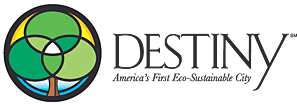 America’s first eco-sustainable city is taking its first steps toward sustainable energy.
America’s first eco-sustainable city is taking its first steps toward sustainable energy.
Destiny, Florida, as you might remember from my February 27, 2009 Domestic Fuel podcast, is a 41,000-acre community founded in 2005 in South Central Florida. Among the city’s eco-friendly features is The Sustainable Energy Farm that produces power from biodiesel, ethanol, solar and wind sources for companies that contribute to sustainable industries, such as building solar panels. Officials hope that one day, the city will have 16,000 green tech jobs. That energy park recently got a green boost when some sustainable feedstock sources… including jatropha, camelina, and new hybrids of sweet sorghum… were planted for study of the next generation of renewable and alternative fuel sources. This press release has details:
Several varieties of sweet sorghum were donated by Global Renewable Energy, and planted by Everglades Farm Equipment with the self-steering, precision guidance Autotrac system, which enables crops to be planted more efficiently, waste less seed, and fertilize more accurately. A new drip fertigation system, designed to reduce water waste, will be overseen by Treasure Coast Irrigation. The camelina, a new potential candidate in the biofuel market, and jatropha were planted by Bio Greens Oils USA.
The Sustainable Energy Farm is also planning to grow arundo donax this spring for testing; arundo donax is a perennial grass, with potential yields of 30 to 35 tons of biomass per acre.
To determine the validity of these crops as future fuels, scientists at the University of Florida will research yields per acre, water and fertilizer consumption, different harvesting techniques, and suitability to the Central Florida climate.
Officials say that Destiny is in the “sweet spot” for biomass production with long-growing seasons and large tracks of land for fields of these new feedstocks. We’ll keep tracking the success of the city and let you know how things go.

